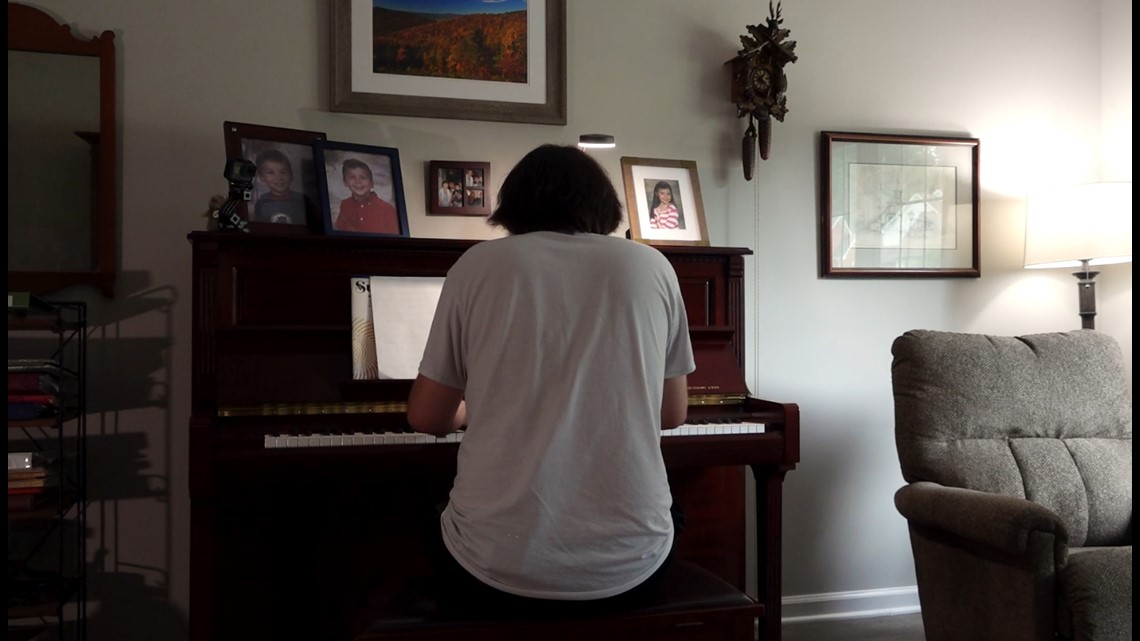Former Gwinnett student says he was falsely imprisoned 4 years | Family claims lack of autism awareness
A teacher received a death threat in 2017. Five years later, Gwinnett investigators don't know who sent it and dropped charges against a former student.

For nearly five years, a Gwinnett County man never wavered. He insisted he never sent a long, rambling email threatening to kill a special education teacher.
Still, he remained in jail without a conviction, for nearly the same time he would have served if found guilty of the crime.
But, the case never went to trial. David Warth was never found guilty. 11Alive Investigates detailed the relationship between Warth and his teacher after his arrest in 2019.
After the election of a new District Attorney, new evidence and a polygraph, prosecutors requested to drop the charges telling a judge it only had “definitively circumstantial evidence."
Warth, now 25, sits in front of a piano at his parent’s house, reflecting on the impact of his arrest.
“It was like someone taking a completely new unhappened life and throwing it into the garbage,” he said.
Warth and his attorneys, Reginald Winfrey and Kamau Mason, are speaking out to urge schools, police and the courts to examine how they treat those who behave differently than what society might consider the norm.
Their message: being on the autism spectrum is not a crime.
“This case is centered and set on autism,” Mason said. “We needed to really explain to the courts what autism is and what autism isn’t. Because autism is not insanity. It’s not post-traumatic stress.”


Leading up to the arrest
To understand the case against Warth, we go back to 2012, when Warth was assigned to the teacher’s Special Education classroom. Intellectually, Warth ranked top of his class. But socially, his autism caused him to miss important social cues.
Warth didn’t like how the teacher or the other students treated him. He didn’t want to spend time segregated from the general student population.
Even after successfully advocating for himself, his hurt feelings lingered. He requested a meeting with his former teacher hoping for an apology.
Instead of clearing the air, the teacher became fearful of Warth. According to court records, she accused him of giving her a “death stare” one day on his way to class.
According to court records, the teacher had co-authored a report as part of his school file that said Warth "requires better understanding to read people and respond in a manner appropriate to the situation." But rather than consider that part of his behavior due to autism, if it indeed happened, she began to report feeling threatened.
Warth denied looking at the teacher with animosity.
Then, Warth’s therapist told the school he had threatened to kill the teacher, even though her reports show him repeatedly denying the accusation. It didn’t matter. The report led to a 12-month temporary protective order (TPO).
Warth complied. He said he didn’t want to be around the teacher anyway and was told fighting the TPO would impact his ability to graduate on time. So, he transferred schools, graduated and then got accepted to Emory.


Even after Warth left, the school resource officer said in a police report; that he continued to follow Warth's social media accounts for more than a year.
It was as a college student, 18 months later, that Warth showed up at the high school wearing a disguise. Warth’s mother said it wasn’t uncommon for him to wear things that would cover his face. But Warth’s mother wasn’t there to explain as he approached the school.
“If the traditional person seeing David in the community see some of those behaviors, they may look at some of those behaviors as being strange, but at the end of the day, none of those behaviors are criminal. That’s just who he is,” Mason said.
Two different people saw Warth and were "alarmed" by his appearance. They called the police.
An email chain between the district, school and Warth detailed his efforts to get school records. Warth said he simply showed up, hoping to retrieve them finally. But when confronted, he refused to answer police questions and instead asked if he was being detained and to call his attorney.
After Warth removed his disguise, one of the officers recognized him and remembered the events that led up to the TPO. The teacher felt shaken and believed he came to harass or stalk her.
The teacher received a long, threatening email five months after that incident. David was arrested again, this time charged with aggravated stalking and denied bond. Even though he had an alibi and witnesses to what he was doing when the email was sent, the court ruled he posed "a significant danger to the community."
Police also searched his parent’s house and David’s dorm at Emory, seizing every electronic he or his family-owned. There was no evidence the letter came from any of those devices.


“The state’s whole theory was this was sent through TOR [The Onion Router] and there was no way to trace where this email actually came from,” Winfrey said.
But Warth’s attorneys said they could trace the email or at least eliminate possibilities. They reached out to TOR, or what some would refer to as the dark web. The company responded with an affidavit stating whoever sent the death threat did not use its platform to do it.
TOR also said the sender did not use TOR to deliver two emails investigators later found Warth received.
“It said you’re about to be falsely accused,” Winfrey said.
If the case went to trial, Warth's attorneys said he would have told the jury “that the people who were supposed to protect him were the people who were harming him.”
Behind the letter
The email at the heart of the charges claimed to be sent on behalf of six people, all anonymous, who "kill on a daily basis" and had undercover informants.
It told the teacher someone would die within 24 hours if she told anyone about the letter. If she didn’t do as instructed, she would be responsible for the mass slaughter of those she loved.
The letter demanded she go to civil court and dismiss any pending divorce and small claims cases. Then, she should go to the prosecutor’s office and ask that all cases involving her be dropped.
The teacher did tell the police, and none of the demands were followed. Police didn't arrest Warth until six weeks after the letter was sent. There are no reports in the court documents of anyone being injured.
“This was not the only email that the Gwinnett County school system had received and not the only one that Brookwood High School had received," Mason said. "All of those other emails were sent to the FBI for investigation."
They said the district didn’t send the email Warth was accused of sending to the FBI because police were convinced he sent it. The district would not comment to 11Alive Investigates on what actions it took to look into the letter or comment on direct questions regarding its policy on this.
11Alive Investigates obtained public records that show the teacher didn’t have any small claims or divorce cases cited in the demand for action. Her only court involvement at the time was a TPO and stalking charge against Warth.


In a police report from February 21, 2017, the officer stated that even after searching Warth's dorm room and his parent's house and reviewing computers and flash drives, they did not find any new evidence linking Warth to the email.
Gwinnett prosecutors at one time offered Warth a plea deal to get out of jail and move on with his life. But he knew the TPO, which he thought would make his problems go away, was now being used against him. He decided to remain in jail for the chance to clear his name.
Even though his attorneys felt his autism explained the misunderstandings around his behavior and his history with the teacher involved, the DA’s office filed a motion to prevent Warth’s attorneys from talking about it. The court agreed.
“The reason that the court stood on the side of the state on this issue was because of over 100 years of precedent that says you can’t, for lack of better words, introduce a medical condition in order to rebut the idea that a person cannot form intent,” Winfrey explained.
Behind the Gwinnett DA Office's decision
11Alive Investigates reached out to the DA’s office to find out why it asked to dismiss the charges after years of motions and delays. In a written response, Assistant District Attorney Drew Unger wrote:
"As sometimes happens, a fresh pair of eyes may have a different perspective on a case. In this particular case, there were a number of prosecutors assigned to the case during its pendency, who for various reasons, left the Gwinnett DA’s Office to pursue other opportunities. The fourth assigned prosecutor, in light of the facts and circumstances up to this point, entered into a stipulated agreement that the defendant undergo a forensic polygraph examination, meaning that the results would be admissible at trial by either side (as detailed in the attached motion to nolle pros). Upon the defendant’s passing of that examination by one of the most highly nationally accredited polygraphers, and given the totality of the circumstances of the case, he determined that the State could not meet its burden of proof beyond a reasonable doubt and he chose to request a dismissal."
According to the report by forensic examiner Richard Rackleff, he asked Warth three key questions.
"Did you send that threatening email to your former teacher at Brookwood High School? Were you stalking or threatening anyone at Brookwood High School in 2017? Do you plan to physically harm anyone at Brookwood High School in any way?"
Warth’s answer to all three was ‘no,’ and according to the report, no deception was indicated.
To further their point, Warth’s attorneys noted all of the letters he wrote while in jail, various attempts to explain his innocence. They asked him not to, but he did it anyway, refusing to remain silent. He never wrote a letter, called, or tried to contact the teacher.
11Alive made efforts to contact the teacher but was unable to reach her. In court, the teacher said she constantly fears his “stalking and terrorizing efforts” to “harm, kill or maim” her. She told the judge that even while Warth was in jail, she avoided family and friends to protect them. She remains convinced Warth sent the letter.
